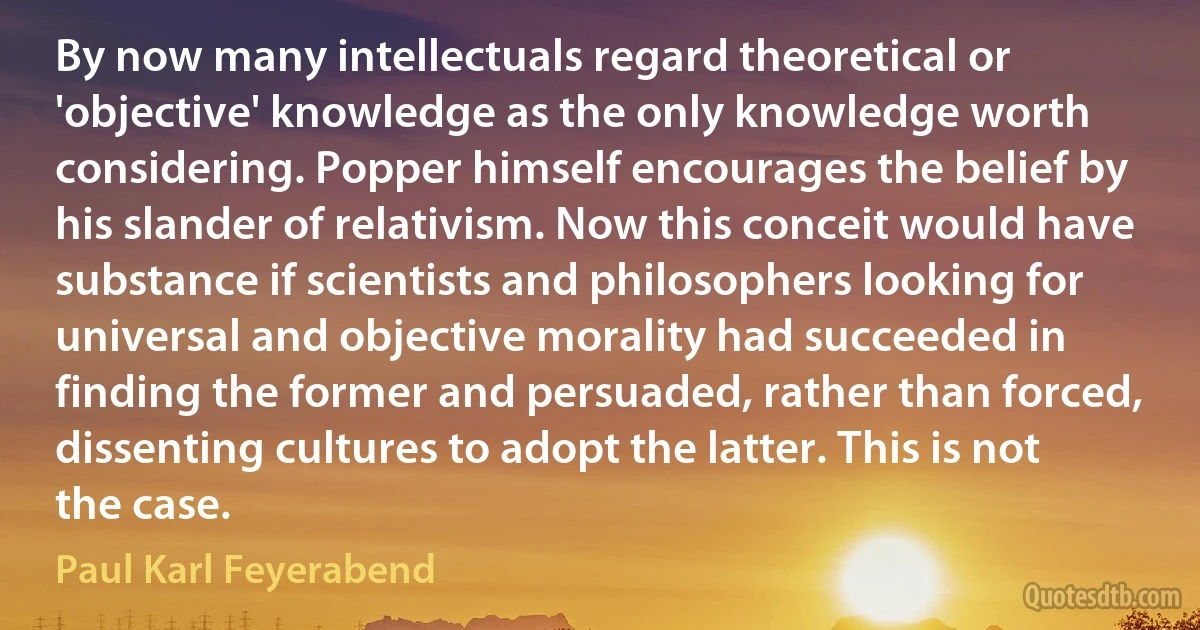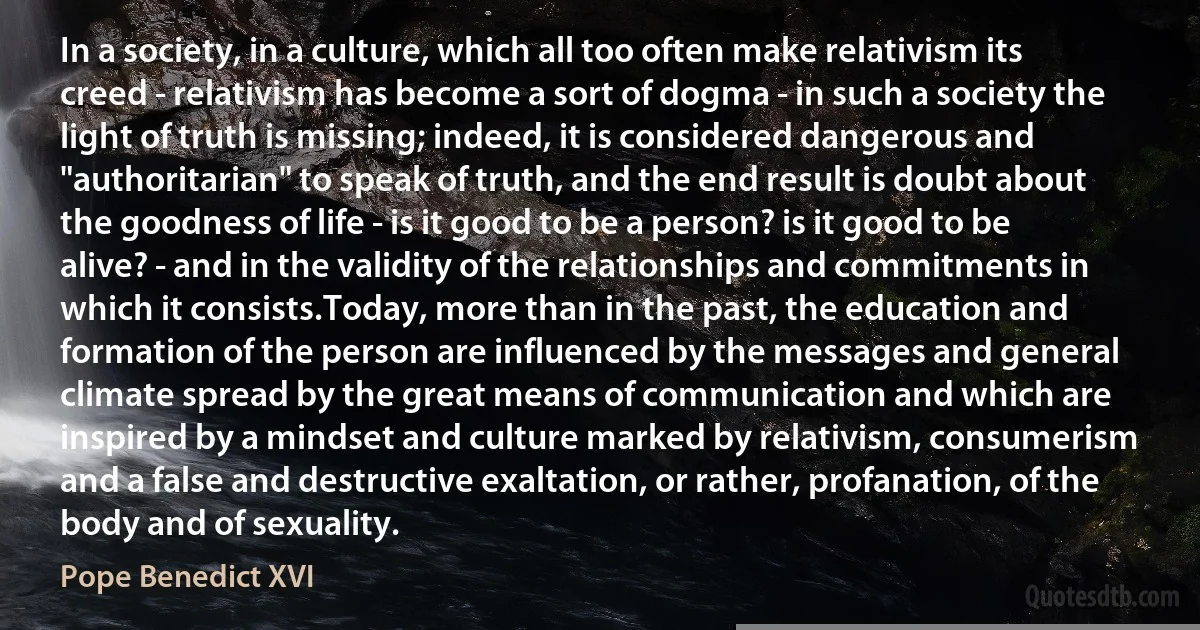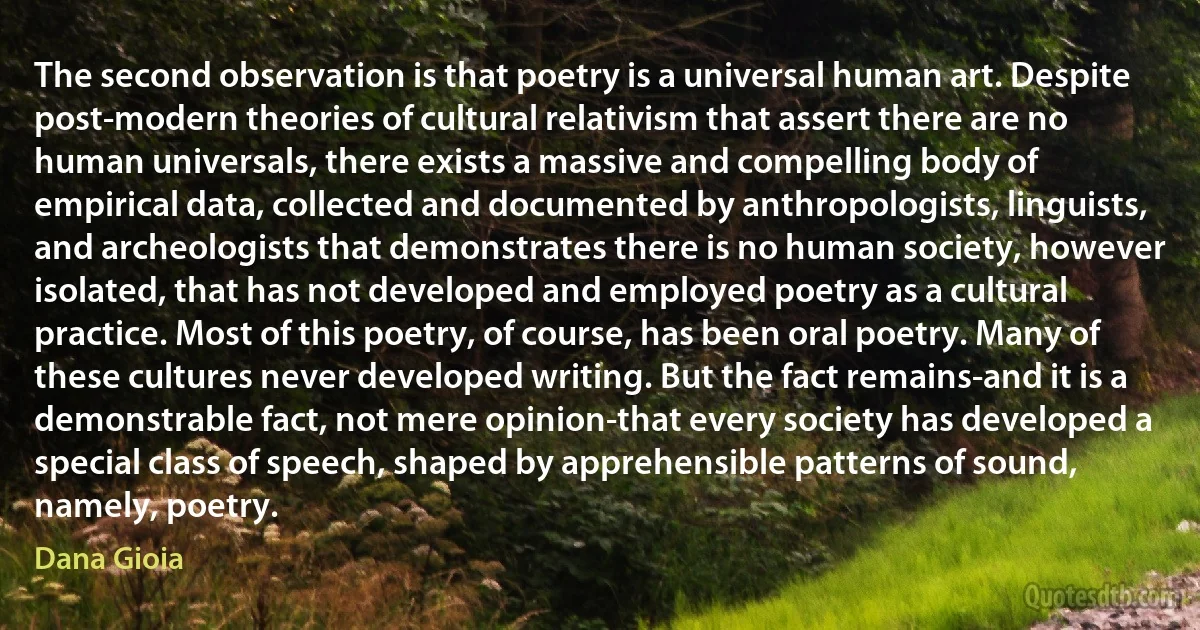Relativism Quotes - page 2
There is also the danger that our system can lead to tragic exploitation. We must come out of the mountain and be concerned about a more humane and just economic order. And I say, this afternoon, that we cannot solve this problem byturning to Communism. Communism is based on an ethical relativism and a metaphysical materialism that no Christian can accept. I do believe that in America we must use our vast resources of wealth to bridge the gulf between abject, deaden-ing poverty and superfluous, inordinate wealth. God has left enough space in this universe for all of his children to have the basic necessities of life.

Martin Luther King Jr.
I think we went through - in America, at least, we went through a period in the '60s and '70s when the education establishment became extremely liberal, and part of that is a flirtation with relativism. And a resistance - it's horrible to think of - of adults telling kids what's right and wrong. What a terrible thing. That's oppression. And so we created these sort of value-free spaces, which conveys a value, which is that there's no right or wrong, everyone decides for themselves. Uh, everyone's opinion is equal. You should say your opinion and then you get a lot of incivility. What I would like to see is a revamped civics curriculum where we teach very explicitly the long tradition of left-right. Um, we teach what each side is. You can't say right about it, that's my language. But, um, you teach what each side is concerned about. You know, very much like the line here. Uh, both are essential. One without the other creates an unbalanced American civic order.

Jonathan Haidt
One of Nietzsche's most important legacies to us ... is his claim that it is desirable and possible to dismantle the Platonic apparatus of Forms, Absolute Truth, the Idea of the Good, etc. and its historical derivatives, such as Kant's transcendental philosophy, and that this can be done without fear of falling into "relativism.”.

Raymond Geuss
Well I'm afraid it simply does, um, [the Catholic Church] does condemn [homosexuality], yes, it calls it a - the official word is disorder, but it was refined by the current Pontiff, Ratzinger, who called it a 'moral evil'. But on the other hand we must remember, as the point that was made is that the church is very loose on moral evils because, although they try to accuse people like me who believe in the empiricism and the enlightenment of somehow what they call moral relativism, as if it's some appalling sin where what it actually means is thought, um, they um, they for example thought that slavery was perfectly fine... absolutely okay, and then they didn't, and what is the point of the Catholic Church if it says 'oh well we couldn't know better because nobody else did'? (To the affirmative team) Then what are you for?!

Stephen Fry
There is something sinister that stems from the fact that freedom and tolerance are so often separated from truth. This is fuelled by the notion, widely held today, that there are no absolute truths to guide our lives. Relativism, by indiscriminately giving value to practically everything, has made 'experience' all-important.

Pope Benedict XVI
Having a clear faith, based on the creed of the church, is often labeled today as a fundamentalism. ... Whereas relativism, which is letting oneself be tossed and "swept along by every wind of teaching," looks like the only attitude acceptable to today's standards.We are moving toward a dictatorship of relativism which does not recognize anything as definitive and has as its highest value one's own ego and one's own desires... The church needs to withstand the tides of trends and the latest novelties. ... We must become mature in this adult faith, we must guide the flock of Christ to this faith.

Pope Benedict XVI
Religion and ethics were not always-or even frequently-mutually compatible. The demands of religious absolutism or fundamentalism or rampaging relativism often reflected the worst aspects of contemporary culture or prejudices rather than a system which both man and God could live under with a sense of real justice.

Dan Simmons
The dominant metaphor of conceptual relativism, that of differing points of view, seems to betray an underlying paradox. Differentpoints of view make sense, but only if there is a common co-ordinate system on which to plot them; yet the existence of a common system belies the claim of dramatic incomparability.

Donald Davidson (philosopher)
[T]ruth is the ground and condition of freedom. Unless it is true that human beings deserve to have fundamental liberties respected and protected, the tyrant does no wrong in violating them. Relativism, skepticism, and subjectivism about truth provide no secure basis for freedom. We should honor civil liberties because the norms enjoining us to respect and protect them are valid, sound, in a word, true.

Robert P. George
Postmodernists parade their relativism as a superior kind of humility - the modest acceptance that we cannot claim to have the truth. In fact, the postmodern denial of truth is the worst kind of arrogance. In denying that the natural world exists independently of our beliefs about it, postmodernists are implicitly rejecting any limit on human ambitions. By making human beliefs the final arbiter of reality, they are in effect claiming that nothing exists unless it appears in human consciousness.

John N. Gray
The foundational morality of the civilized world is best summarized in the Ten Commandments. Moral relativism and secular humanism are slippery slopes. The terminal moraine at the base of these slopes is a rubble pile consisting of either despotism and pillage, or anarchy and the depths of depravity. I believe that it takes both faith and friends to survive perilous times.

James Wesley Rawles
The validity of demonstrably wrong law cannot conceivably be justified. However, any answer to the question of the purpose of law other than by enumerating the manifold partisan views about it has proved impossible- and it is precisely on that impossibility of any natural law, and on that alone, that the validity of positive law may be founded. At this point relativism, so far only the method of our approach, enters our system as a structural element.
Ordering their living together cannot be left to the legal notions of the individuals who live together, since these different human beings will possibly issue contradictory directions. Rather, it must be uniformly governed by a transindividual authority. Since, however, in the relativistic view of reason and science are unable to fulfill that task, will and power must undertake it. If no one is able to determine what is just, somebody must lay down what is to be legal.

Gustav Radbruch



